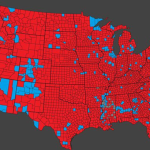
Smartphone footage is now a central pillar of US police accountability activism. It brought nationwide attention to the death of George Floyd, for instance, and was crucial to convicting Derek Chauvin of murder.
But in the state of Arizona, starting in September, a new law will go into effect prohibiting the filming of police officers from within eight feet.
House Bill 2319 was signed by Gov. Doug Ducey this past Wednesday, stating that it’ll be illegal for people to record police officers from within eight feet after a verbal warning, while police are conducting “law enforcement activity.” The bill defines law enforcement activities as arrests, questioning suspicious individuals, and handling those who are emotionally disturbed.
The law makes some exceptions for occupants of vehicles and those in enclosed structures on private property. They are permitted to film as long as they are not being arrested or searched. Someone who is in a car stopped by police or is being questioned is also allowed to record the interaction. Unless, however, an officer determines that they’re interfering with law enforcement activity or the area is deemed unsafe for civilians.
Those found to be in violation of HB 2319 after being asked to stop could earn “a class 3 misdemeanor, which comes with a minimum of 30 days in jail,” the Arizona Mirror reported back in March. The bill originally made it illegal to record within 15 feet before being changed “to reflect eight-foot moving buffer zones upheld by the U.S. Supreme Court 14 years ago between protestors and abortion clinic patients,” the Arizona Mirror said.
Supporters of the bill, including the bill’s sponsor, State Rep. John Kavanagh believe the bill will help to keep officers safe from harm. In an interview with Arizona PBS, Kavanagh stated that “Nobody walks up to a cop when he is questioning a suspicious person or arresting somebody and stands one or two feet away. Common sense says you’re asking for trouble.”
Arizona police officers are some of the highest-paid employees in the state, and according to the Phoenix New Times, the biggest danger to Arizona cops in the past year was COVID-19.
Free speech advocates have condemned the bill as unconstitutional, vague and giving police disproportionate discretion to enforce. They argue that having laws like this will make it harder for citizens to hold the police accountable for misconduct.
“Members of the public have a first amendment right to video police in public places and what this tries to do is discourage people from doing that,” constitutional attorney Dan Barr told AZ Family, a local news affiliate. In addition, Barr said that there are already laws in the state regarding police interference making the new bill redundant.
The National Press Photography Association was one of several associations and media outlets that signed a letter back in February, encouraging the governor to veto the bill. Notable signatories of the letter included The Atlantic, The Associated Press, The New York Times, and the Society of Professional Journalists.
“We are extremely concerned that this language violates not only the free speech and press clauses of the First Amendment,” the open letter said, “but also runs counter to the ‘clearly established right’ to photograph and record police officers performing their official duties in a public place.”
Powered by WPeMatico






